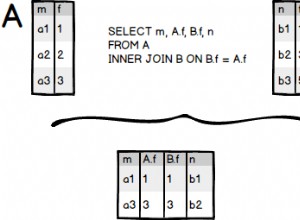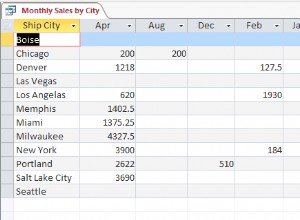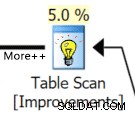In Oracle, il LOWER() la funzione restituisce il suo argomento con tutte le lettere in minuscolo.
Sintassi
La sintassi è questa:
LOWER(char)
Dove char può essere di qualsiasi tipo di dati CHAR , VARCHAR2 , NCHAR , NVARCHAR2 , CLOB o NCLOB .
Esempio
Ecco un semplice esempio da dimostrare:
SELECT LOWER('NEW ZEALAND')
FROM DUAL;Risultato:
LOWER('NEWZEALAND')
______________________
new zealand Lo stesso vale quando l'argomento usa maiuscole e minuscole:
SELECT LOWER('New Zealand')
FROM DUAL;Risultato:
LOWER('NEWZEALAND')
______________________
new zealand E se l'argomento è già minuscolo, il risultato è lo stesso dell'input:
SELECT LOWER('new zealand')
FROM DUAL;Risultato:
LOWER('NEWZEALAND')
______________________
new zealand Valori Nulli
Passaggio null restituisce null :
SET NULL 'null';
SELECT LOWER(null)
FROM DUAL;Risultato:
LOWER(NULL) ______________ null
Per impostazione predefinita, SQLcl e SQL*Plus restituiscono uno spazio vuoto ogni volta che null si verifica come risultato di un SQL SELECT dichiarazione.
Tuttavia, puoi utilizzare SET NULL per specificare una stringa diversa da restituire. Qui ho specificato che la stringa null deve essere restituito.
Conteggio argomenti errato
Chiamando LOWER() senza passare alcun argomento restituisce un errore:
SELECT LOWER()
FROM DUAL;Risultato:
Error starting at line : 1 in command - SELECT LOWER() FROM DUAL Error at Command Line : 1 Column : 8 Error report - SQL Error: ORA-00909: invalid number of arguments 00909. 00000 - "invalid number of arguments" *Cause: *Action:
E il passaggio del numero errato di argomenti genera un errore:
SELECT LOWER('New', 'Zealand')
FROM DUAL;Risultato:
Error starting at line : 1 in command -
SELECT LOWER('New', 'Zealand')
FROM DUAL
Error at Command Line : 1 Column : 8
Error report -
SQL Error: ORA-00909: invalid number of arguments
00909. 00000 - "invalid number of arguments"
*Cause:
*Action: 



